Douglas Habecker and Courtney Donovan Smith giddily remember their first encounter.
“We were at an anniversary dinner at TGI Fridays … sucking helium out of a balloon and talking in a squeaky voice,” Smith recalls.
“It was only him. I wouldn’t do that,” Habecker adds. “But we were all laughing along.”
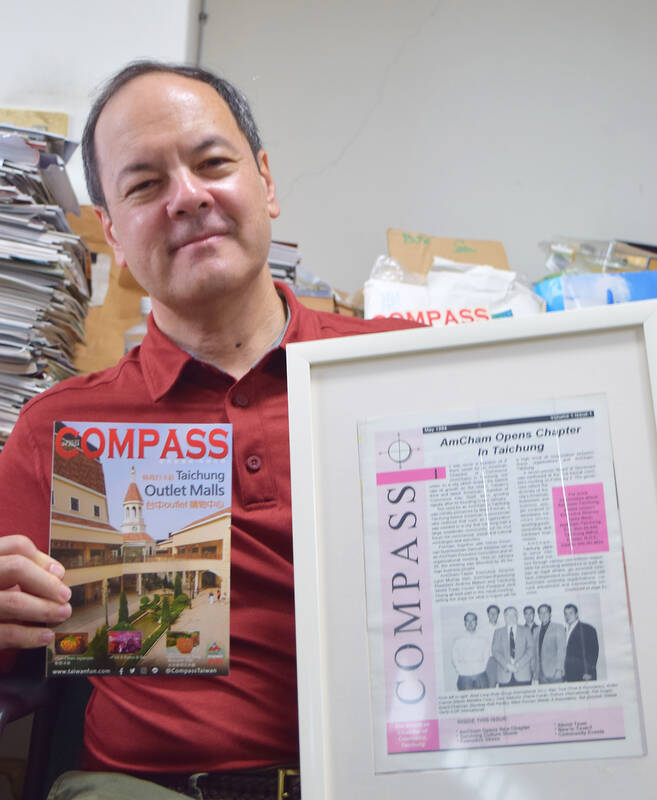
Photo: John Evans
That chance encounter back in 1998 was fortunate for the two Taichung residents as it helped shape Compass Magazine into what it is today. The glossy-covered monthly publication found in restaurants and bars throughout the city celebrated its 30th birthday last month.
Co-publishers Habecker and Smith recently talked at length about the magazine’s origins, its current relationship with its readers and the challenges of doing a print publication in an age of digital dominance.
‘INTERNATIONAL PERSPECTIVE’
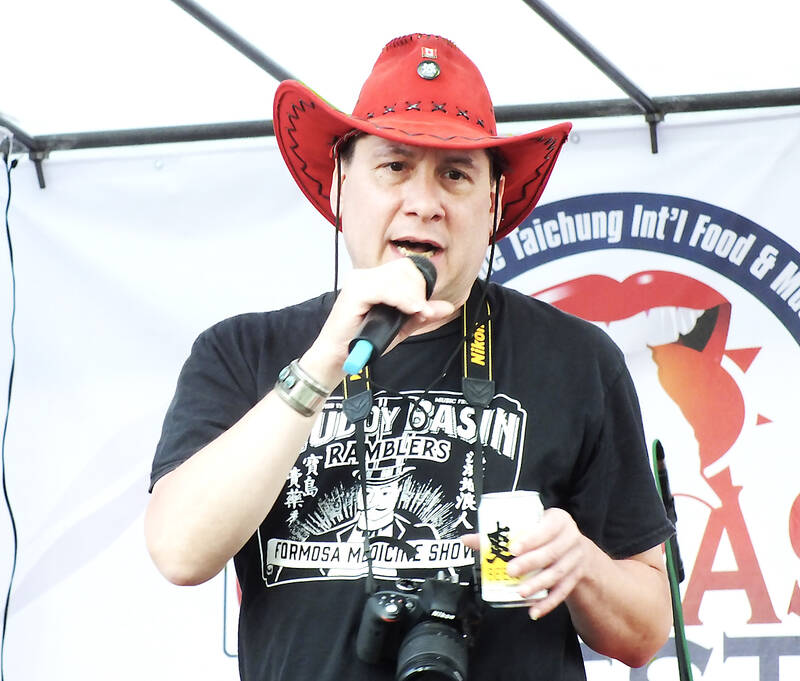
Photo courtesy of Uvia Chang/Compass Magazine
What started as a humble four-page newsletter, given out to a dozen or so businesses, has evolved into its current form, a colorful 72-page publication read by an estimated 20,000 to 30,000 people each month. These days upwards of 200 restaurants, bars and hotels receive copies of the free magazine. For visitors, Compass can also be found at airport and train terminals.
“We cover Taichung from a more international perspective,” says Habecker, who, along with a partner, started Compass back in 1994 as a way of informing English-speaking residents about things going on in the city. These days, however, about 90 percent of readers are Taiwanese.
Throughout the years the magazine’s mission of promoting the best of Taichung has remained unchanged. While some features such as political cartoons, classified ads and the humorous street interviews are gone, the focus is still on showcasing where to eat and drink, with newly opened businesses receiving special attention.
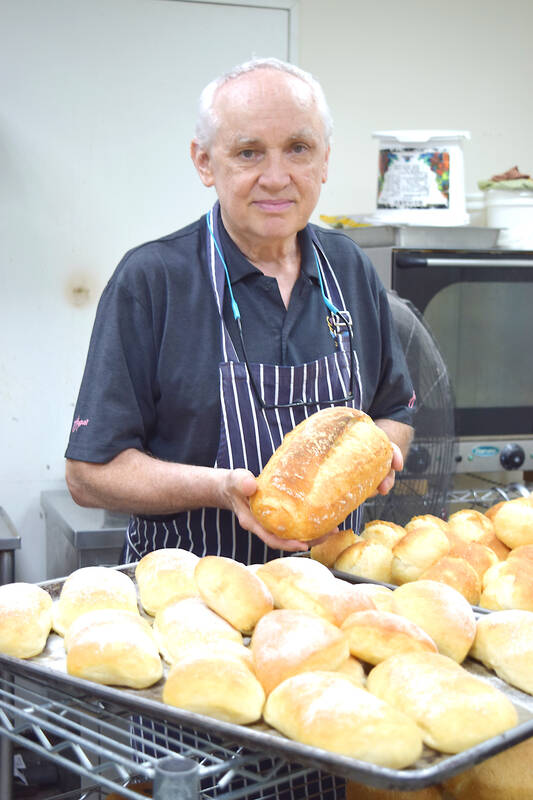
Photo: John Evans
Compass shies away from official restaurant reviews. Instead, the short write-ups show off the positive qualities of each establishment, whether it’s an intimate coffeehouse or grandiose hot pot restaurant.
Originally supported by the American Chamber of Commerce Taichung, Compass transitioned from an all-English newsletter to a bilingual magazine in 1998.
It was at this time that Smith, then in his late 20s, teamed up with Habecker, then in his early 30s. A few years later, the two cemented their partnership when Smith became Compass Magazine’s co-publisher.

Photos courtesy of Compass Magazine
Habecker, with an affable, laid-back style, focused mostly on the editorial side of the magazine, with Smith, and his infectious excitement, pushing to expand the business both digitally and regionally.
“Our styles really complement each other,” Smith says.
As ad sales increased the magazine grew to the point where they were printing thousands of copies each month. In addition, pages were added and maps were included. Habecker left his job as a newspaper reporter with Taiwan News to dedicate his time to the upstart magazine.
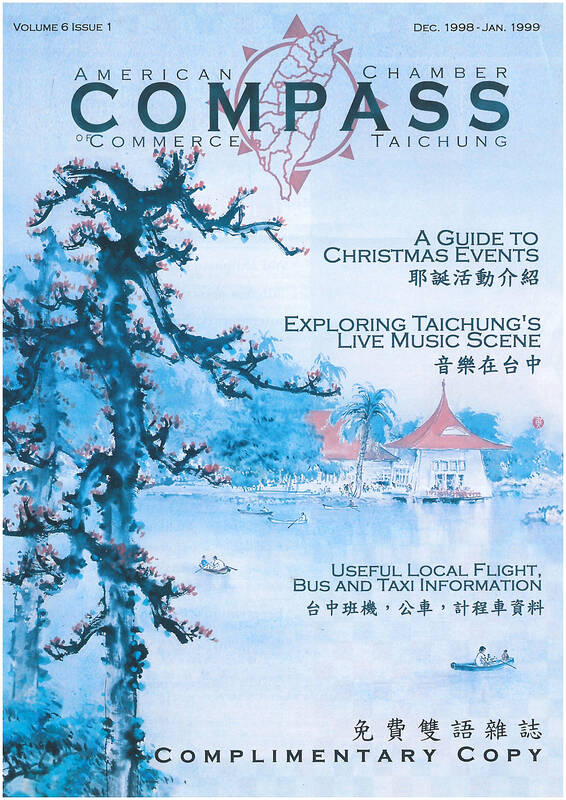
Photo courtesy of Compass Magazine
In the old days, the piles of magazines were loaded into a car or onto a motorcycle, with Habecker and Smith personally delivering the magazines to each business.
These days, however, it’s mostly done through a courier service, although Habecker still zips around the city giving businesses their dozen or so magazines.
“I still enjoy getting out there and exploring the city,” Habecker says. “I really do love Taichung and seeing it grow. It’s a dynamic place … ever changing.”
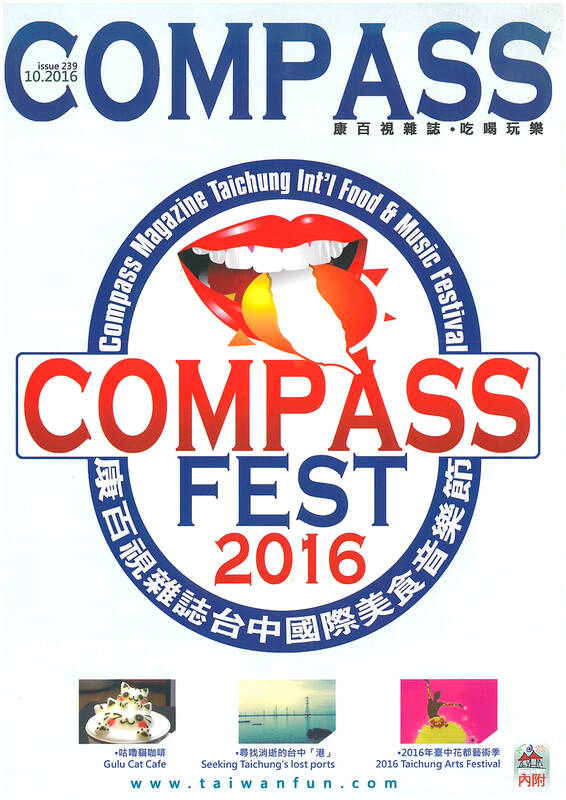
Photo courtesy of Compass Magazine
EXPANSION
With ambition growing, Habecker and Smith expanded the business model and started similar publications, one in Taipei with Taiwan Fun and another in Kaohsiung with FYI South. A smaller version also covered Tainan.
The media expansion worked for a while, but depending on inconsistent advertising made the venture financially risky, they said.
“It was just too stressful,” Habecker says. “We decided to close those magazines and just focus on Taichung.”
The current challenge, they said, is publishing a print magazine in a time when it’s so easy to access information online. Whether it’s through Facebook, Yelp or other social media sites, advertisers can reach out to consumers easier than ever before.
Not to be outdone, the magazine has increased its online presence. Businesses can advertise on Compass’s Facebook and Instagram sites as well as on its Web site, Taiwanfun.com. But even with these incentives, publishing a monthly magazine is still an uncertain business.
“It’s kind of a miracle we still exist,” Smith says.
Habecker, with feelings of pride and determination, said continuing the magazine was in a sense an act of public service. It’s good for the city, and more than just a business, he says.
“We’ll do this for as long as we possibly can,” Habecker says. “It’s our baby.”
These days, Habecker and Smith rely on other sources of income to support themselves, with both deeply involved in promoting central Taiwan.
‘VOICE OF THE CITY’
Habecker, born in Hualien to missionary parents, is employed as a cross-cultural trainer for international companies. He is also an AmCham Taichung board member. Smith, a Canadian who moved to Taiwan as a 19-year-old, is a correspondent for International Community Radio Taipei (ICRT) and a columnist for this paper. A political junkie, he is also co-founder of Taiwan Report. Both are former chairmen of AmCham Taichung.
“Doug and Donovan are the voice of the city,” says Dereke Bruce, owner of Finga’s Fine Foods. “They’re everywhere.”
Bruce, one of the original Compass advertisers, says the newsletter and later the magazine were immensely popular because there was nothing like it at the time.
“You couldn’t get enough of them. [People] would take them all.”
Bruce initially placed an ad just to support Habecker and his start-up newsletter. Through his bakery, and Italian and Mexican restaurants, he continued to advertise in the magazine for the next 28 years.
Another loyal Compass supporter, and a financial lifeline of sorts, has been the Taichung City Government. Each month the city has a multi-page spread promoting some aspect of Taichung tourism or business.
It started back in 2008 when Habecker went to former Taichung mayor Jason Hu (胡志強) asking for help. The city, looking to expand internationally and promote itself in English, agreed to cooperate. This amicable relationship has continued through the current administration. In a 2018 interview with Habecker and Smith, now-retired Taichung deputy mayor Bruce Linghu (令狐榮達) called Compass Magazine a “window to the world” and a “goodwill ambassador.”
FICKLE BUSINESS
But relying solely on advertising for revenue is a fickle business for a free magazine.
“When times are bad, [advertising] is the first thing to go,” says Habecker, rattling off a list of hardships, including the 921 Earthquake in 1999, the SARS outbreak a few years later and the global financial crisis of 2008.
By comparison, Compass weathered the COVID pandemic relatively well, he said, because Taiwan never went into a hard lockdown and restaurants still needed to advertise.
Habecker credits the magazine’s longevity in part to its dedicated staff, including long-term editors, designers and translators.
“They work hard, and I think they really feel a sense of ownership with the magazine,” he says.
With the magazine on a stable footing, Compass has tried to reach out to the community in other ways. The Compass Intercultural Exchange Association is a non-profit offshoot that helps connect local businesses and individuals to the international community. A recent event helped about 100 students network with potential employers.
The magazine is also involved in promoting a charity gala sponsored by AmCham Taichung. In recent years the event has raised more than NT$1 million annually for needy children.
In addition to the annual Compass summer pool party, there’s a food and music festival that draws thousands of spectators each year to its multi-day outdoor bash. This year’s festival, now in its 20th year, is slated for late September, says Smith, who organizes the music side of the event.
Looking back at the magazine’s longevity, Habecker and Smith said they’re proud of Compass and its enduring relationship with the community. The joy, they said, can come in random ways. Perhaps it’s running into a couple who met through the old Compass classified ads. Or maybe it’s just a thanks from a first-time reader.
“We love getting feedback,” Habecker says. “We just feed off of those compliments.”
And as Taichung has gone from feeling like a sleepy little town a few decades ago to what it is today, the nation’s second largest city, Compass has been there.
“Taichung is immensely more international,” Habecker says. “And I’d like to think that we had a tiny impact in helping that growth.”

Under pressure, President William Lai (賴清德) has enacted his first cabinet reshuffle. Whether it will be enough to staunch the bleeding remains to be seen. Cabinet members in the Executive Yuan almost always end up as sacrificial lambs, especially those appointed early in a president’s term. When presidents are under pressure, the cabinet is reshuffled. This is not unique to any party or president; this is the custom. This is the case in many democracies, especially parliamentary ones. In Taiwan, constitutionally the president presides over the heads of the five branches of government, each of which is confusingly translated as “president”

Sept. 1 to Sept. 7 In 1899, Kozaburo Hirai became the first documented Japanese to wed a Taiwanese under colonial rule. The soldier was partly motivated by the government’s policy of assimilating the Taiwanese population through intermarriage. While his friends and family disapproved and even mocked him, the marriage endured. By 1930, when his story appeared in Tales of Virtuous Deeds in Taiwan, Hirai had settled in his wife’s rural Changhua hometown, farming the land and integrating into local society. Similarly, Aiko Fujii, who married into the prominent Wufeng Lin Family (霧峰林家) in 1927, quickly learned Hoklo (commonly known as Taiwanese) and

The Venice Film Festival kicked off with the world premiere of Paolo Sorrentino’s La Grazia Wednesday night on the Lido. The opening ceremony of the festival also saw Francis Ford Coppola presenting filmmaker Werner Herzog with a lifetime achievement prize. The 82nd edition of the glamorous international film festival is playing host to many Hollywood stars, including George Clooney, Julia Roberts and Dwayne Johnson, and famed auteurs, from Guillermo del Toro to Kathryn Bigelow, who all have films debuting over the next 10 days. The conflict in Gaza has also already been an everpresent topic both outside the festival’s walls, where

The low voter turnout for the referendum on Aug. 23 shows that many Taiwanese are apathetic about nuclear energy, but there are long-term energy stakes involved that the public needs to grasp Taiwan faces an energy trilemma: soaring AI-driven demand, pressure to cut carbon and reliance on fragile fuel imports. But the nuclear referendum on Aug. 23 showed how little this registered with voters, many of whom neither see the long game nor grasp the stakes. Volunteer referendum worker Vivian Chen (陳薇安) put it bluntly: “I’ve seen many people asking what they’re voting for when they arrive to vote. They cast their vote without even doing any research.” Imagine Taiwanese voters invited to a poker table. The bet looked simple — yes or no — yet most never showed. More than two-thirds of those